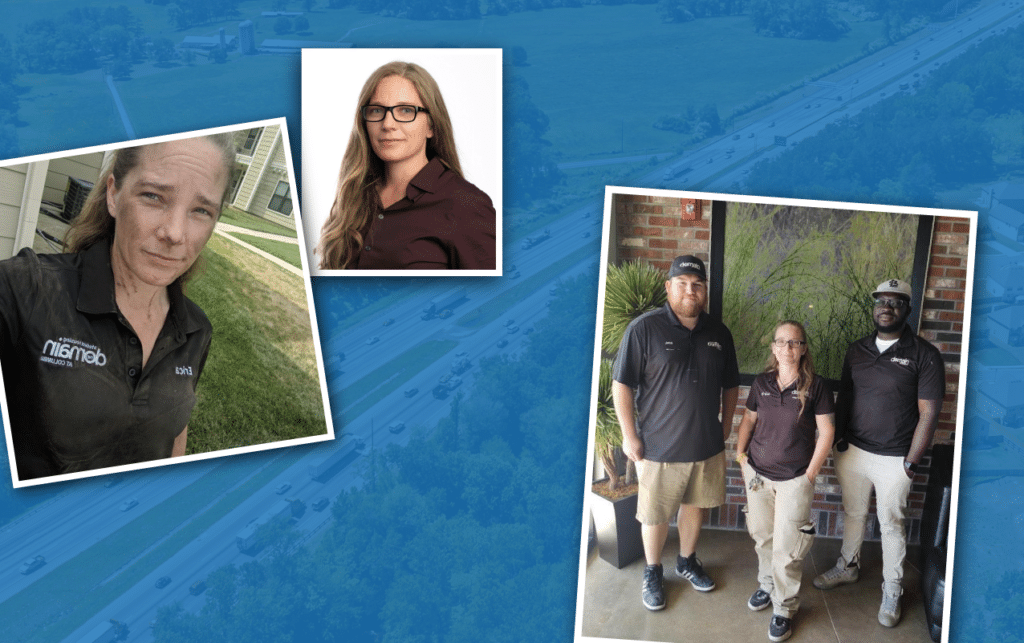A Q&A With Traveling Facilities Operations Specialist:
Erica Counts
Sometimes, life comes full circle and reminds you how small the world can be. While traveling to an industry event recently, I had a nostalgic encounter when I ran into an old friend from high school. Twenty years after graduation, Erica Counts and I were surprised and happy to find life had drawn us to the same industry and that we were traveling on the same flight!
After catching up on our personal lives, I was interested to learn that Erica is a traveling maintenance professional working for Campus Life and Style Apartments, and she travels all across the country with her tools in tow!
As part of a centralized maintenance solution, Erica is part of a corporate team that regularly visits onsite staff to oversee project management, train on new skills and processes, and relieve workload pressures.
So, I had to know: What does it take to be a maintenance professional in today’s centralized services environment amid a prolonged skilled worker shortage?
To help answer my questions, I sat down with Erica, Facilities Operations Specialist, to get her perspective on what it’s like to be a traveling maintenance professional and how she overcomes industry-wide challenges like labor shortages, increased workload, and maintaining a positive employee culture.
Kayla Ware (KW): How did you get started in the property management industry?
Erica Counts (EC): After working in construction for many years, I got started in hotel maintenance. From there, it was a natural progression into a multifamily maintenance position. After more than 10 years, I enjoy the stability of the work and the diversity and perspective of working with people in various regions. I also like figuring out the inner workings of each property. They are all distinct and need to be managed differently. For instance, the building codes are different in Missouri than they are in Florida or Texas, for example. You can have two properties in the same city, and they can be different to manage based on size, how they were built, and the time period they were built in. It is a lot to keep up with, but I love it!
KW: What challenges do you face as a facilities operations specialist today?
EC: One of the biggest challenges is the high workload amid a skilled worker shortage. In my line of work, there is simply too much work to do and not enough people to do it. This can lead to burnout, accidents, and decreased productivity.
Another challenge is making sure everyone has the training they need to do the job. In this industry, many maintenance operators are not properly trained on the equipment they are responsible for. Some companies hire temporary help with little to no job knowledge and sometimes a language barrier, depending on the region. This can lead to mistakes and safety hazards. In my role, I am responsible for training onsite teams and reinforcing processes that ensure safety.
KW: You mentioned participating in the hiring process for techs and suppliers at your company. Can you share your experience related to the ongoing staffing shortages and what you believe is attributing to those shortages?
EC: It is no secret that multifamily maintenance is facing a significant staffing shortage. This is due to several factors, including the aging workforce, the increasing complexity of equipment, and the lack of training available. It is a challenging position because you need to know everything: construction, appliance repair, HVAC maintenance, fixture installs, and more. Doing as much as you can in-house without calling an outside company is always a goal. Sometimes you cannot avoid it, but you try!
But as a result, maintenance operators are often overworked, stressed, and sometimes not equipped for the tasks ahead of them. I am proud to work for a company that prioritizes safety and training for our onsite teams.
KW: We have heard a lot about centralized departments in multifamily in the past year. How has a centralized maintenance strategy helped your company address the skilled worker shortage?
EC: Centralized maintenance can help address shortages by consolidating resources and streamlining processes. This can help improve efficiency and productivity across several teams and drive synergies that benefit each one. Centralized maintenance also lends itself to a more unified training and development strategy, which can help improve the skills of maintenance operators on staff.
KW: What advice do you have for other maintenance operators in similar situations?
EC: Focus on creating a positive work environment and culture for your onsite staff. Doing this will help to attract and keep good, qualified maintenance staff. I also recommend investing in training and development programs that ensure employees have the skills they need to do their jobs safely and without frustration. Lastly, it is important that each employee has a clear career path and they feel like there is growth and upward movement possible within the company. It takes great leadership and a people-focused company culture to put solutions in place to address these issues.
As for advice for other maintenance professionals like myself, I would say always be safe. Choose a company that prioritizes your safety and training above workload. Also, find ways to develop yourself. Work on your customer service skills and be comfortable talking to residents. You become virtually invaluable if you can complete work orders and leave residents with a positive experience.
KW: In your view, what can be done to address the long-term implications of the skilled worker shortage in multifamily?
EC: If the industry does not take steps to address the shortage, it could lead to staff burnout, increased safety risks, and even job losses from workers leaving the trade altogether. Several things can be done to address the long-term implications of the staffing shortage, including:
- Offering competitive wages and benefits.
- Investing in training and development programs.
- Creating a positive work environment and culture.
- Centralizing maintenance operations.
- Promoting from within the organization.
KW: You also work with many different onsite office teams and likely have seen what team dynamics work well and what doesn’t. Tell us, what are some things onsite office staff can do to support the maintenance team?
EC: When I travel to visit our onsite teams, many of them just need an extra hand for a week or two to overcome a large turn, renovations, or bringing on a new property. Sometimes, I don’t pick up a single tool. Instead, what the teams need is someone to direct how to handle work orders and dig them out of the current backlog.
It is important to know when to hire a supplier for support and when to have your staff handle work orders while at the same time balancing resident satisfaction.
Here are some practical ways the front office staff can help support maintenance crews:
- Help update and store unit records of work done, appliance age, etc.
- Solid key management.
- Effective turn management.
- Display confidence in your hard-working, maintenance team by “having their backs” on the phone.
- Talk to the resident to understand the issue thoroughly.
- Avoid putting in duplicate tickets.
- Help close out tickets that are complete.
Maintenance support in practice might look like this:
- If there are a bunch of work orders for something we have outside contracts for like pest control or cable, office staff can (and should) call a supplier rather than clogging up the system with orders.
- Communicate! When the front office sees multiple work orders for the same unit and the same problem, talk to the resident and the maintenance staff to understand the issue. Don’t just put in another order and call it a day.
In closing, it’s a challenging but rewarding career in an industry I feel fortunate to be a part of. I’m so grateful to Erica for sharing her experience as a traveling maintenance professional. She shares an important perspective on maintenance in multifamily, and I appreciate having the opportunity to pass along her words of wisdom!
Want to read more about the maintenance impact on resident experience? Get our latest ebook, “Beyond Four Walls: Exploring the Influence of Maintenance on Resident Experience” by downloading it for free today!



